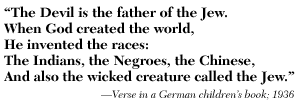
|
|
|

|

|

|

|
|
Click on an image to see a larger, more detailed picture.
|
|
|
|
|
| 1936: The Nazis |

|
pg. 103 |

|
|
|
|
| |

|
 German troops cross the Rhine River on March 7, 1936, en route to reoccupying the Rhineland. The demilitarization of this border region had been mandated by the Versailles Treaty and was integral to the post-World War I security system designed to prevent future German incursions into France. Although the move was publicly deplored by Western diplomats, nothing was done to prevent it. The remilitarization of the Rhineland enhanced Hitler's stature within Germany and demonstrated the defensive nature of French military strategy.
German troops cross the Rhine River on March 7, 1936, en route to reoccupying the Rhineland. The demilitarization of this border region had been mandated by the Versailles Treaty and was integral to the post-World War I security system designed to prevent future German incursions into France. Although the move was publicly deplored by Western diplomats, nothing was done to prevent it. The remilitarization of the Rhineland enhanced Hitler's stature within Germany and demonstrated the defensive nature of French military strategy.
Photo: William O. McWorkman/United States Holocaust Memorial Museum Photo Archive
|
 A German girl pins a native flower on a trooper. The remilitarization of the Rhineland was a public relations bonanza for the Nazi regime. Local inhabitantsņfew of whom were Nazi Party membersņapplauded their ņliberation,ņ while the myth of Hitler's invincibility received additional reinforcement.
A German girl pins a native flower on a trooper. The remilitarization of the Rhineland was a public relations bonanza for the Nazi regime. Local inhabitantsņfew of whom were Nazi Party membersņapplauded their ņliberation,ņ while the myth of Hitler's invincibility received additional reinforcement.
Photo: UPI/Corbis-Bettmann
|
 Carl von Ossietzky, a leading German pacifist and editor of the left-wing political weekly Die Weltbuehne (The World Stage), stands before an SS guard at the Esterwegen, Germany, concentration camp. Arrested after the Reichstag fire in 1933 and sentenced to a labor camp, Ossietzky contracted tuberculosis while in Esterwegen. When his disease grew worse, he was transferred to a Berlin hospital in May 1936; he died there two years later. Ossietzky became an international cause célèbre when the Nazi regime refused to let him accept the 1935 Nobel Peace Prize.
Carl von Ossietzky, a leading German pacifist and editor of the left-wing political weekly Die Weltbuehne (The World Stage), stands before an SS guard at the Esterwegen, Germany, concentration camp. Arrested after the Reichstag fire in 1933 and sentenced to a labor camp, Ossietzky contracted tuberculosis while in Esterwegen. When his disease grew worse, he was transferred to a Berlin hospital in May 1936; he died there two years later. Ossietzky became an international cause célèbre when the Nazi regime refused to let him accept the 1935 Nobel Peace Prize.
Photo: Bundesarchiv/United States Holocaust Memorial Museum Photo Archive
|
|

|

|

|

|
 March 3, 1936: Henceforth, Jewish doctors are denied the right to practice medicine at German government hospitals.
March 3, 1936: Henceforth, Jewish doctors are denied the right to practice medicine at German government hospitals.
|
 March 7, 1936: In defiance of the Versailles Treaty and other international agreements, German troops occupy the Rhineland. Although publicly denouncing Hitler's action, France, Great Britain, and the United States accept it--another important step in appeasing Hitler and in encouraging him to make further demands in Europe.
March 7, 1936: In defiance of the Versailles Treaty and other international agreements, German troops occupy the Rhineland. Although publicly denouncing Hitler's action, France, Great Britain, and the United States accept it--another important step in appeasing Hitler and in encouraging him to make further demands in Europe.
|
 March 9, 1936: Jews are killed and injured during an antisemitic pogrom at Przytyk, Poland.
March 9, 1936: Jews are killed and injured during an antisemitic pogrom at Przytyk, Poland.
|
 March 17, 1936: A mass demonstration of Polish Jews, left-wingers, and liberals protests antisemitism in Poland.
March 17, 1936: A mass demonstration of Polish Jews, left-wingers, and liberals protests antisemitism in Poland.
|
 March 29, 1936: SS guard formations are renamed SS-Totenkopfverbände (SS-Death's Head Units). They provide guards for concentration camps.
March 29, 1936: SS guard formations are renamed SS-Totenkopfverbände (SS-Death's Head Units). They provide guards for concentration camps.
|
 March 29, 1936: A Reichstag "election" is held. Hitler's policies are approved by 98 percent of the voters.
March 29, 1936: A Reichstag "election" is held. Hitler's policies are approved by 98 percent of the voters.
|
|
|
|
|
| 1936: The Nazis |

|
pg. 103 |

|
|
The Holocaust Chronicle
© 2009 Publications International, Ltd.
|
|
